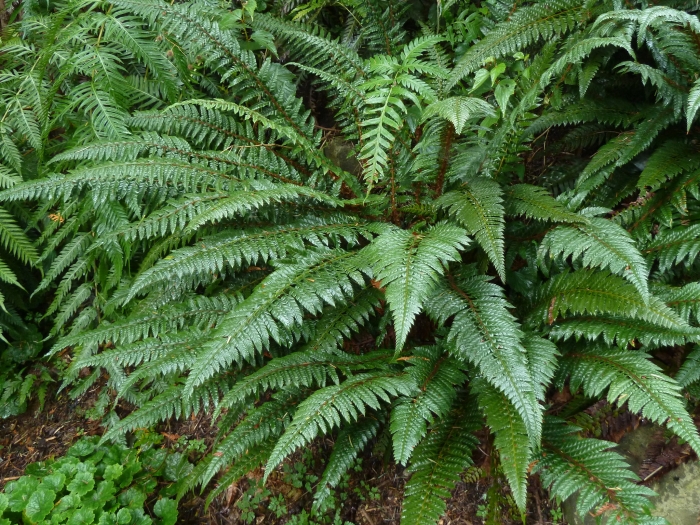Asian Saber Fern
(Polystichum neolobatum)
Asian Saber Fern (Polystichum neolobatum)
/
/

Wendy Cutler
CC BY 2.0
Image By:
Wendy Cutler
Recorded By:
Copyright:
CC BY 2.0
Copyright Notice:
Photo by: Wendy Cutler | License Type: CC BY 2.0 | License URL: https://creativecommons.org/licenses/by-sa/2.0/ | Uploader: wlcutler | Publisher: Flickr |




































Estimated Native Range
Summary
Polystichum neolobatum, commonly known as Asian Saber Fern, is an evergreen fern native to the understory of temperate forests in East Asia, particularly in regions of China, Japan, and Taiwan. It typically grows to a height and width of 1-3 feet (0.3-0.9 meters), featuring glossy, dark green fronds that have a sword-like appearance and are arranged in an attractive, arching rosette. The fronds are bi-pinnate, giving them a feathery texture, and they can add a lush, tropical feel to garden settings.
Asian Saber Fern is appreciated for its year-round foliage and its ability to thrive in shaded conditions, making it an excellent choice for woodland gardens, shaded borders, or as an understory plant in shaded areas of the landscape. It is also suitable for container planting, where its evergreen nature can be enjoyed up close. This fern prefers consistently moist, well-drained soil that is rich in organic matter. While it is relatively low maintenance, it benefits from the removal of old fronds to maintain a tidy appearance. It is not known to have serious disease or pest problems, but it can suffer from root rot if the soil is too wet.CC BY-SA 4.0
Asian Saber Fern is appreciated for its year-round foliage and its ability to thrive in shaded conditions, making it an excellent choice for woodland gardens, shaded borders, or as an understory plant in shaded areas of the landscape. It is also suitable for container planting, where its evergreen nature can be enjoyed up close. This fern prefers consistently moist, well-drained soil that is rich in organic matter. While it is relatively low maintenance, it benefits from the removal of old fronds to maintain a tidy appearance. It is not known to have serious disease or pest problems, but it can suffer from root rot if the soil is too wet.CC BY-SA 4.0
Plant Description
- Plant Type: Fern
- Height: 1-3 feet
- Width: 1-3 feet
- Growth Rate: Moderate
- Flower Color: N/A
- Flowering Season: Non-Flowering
- Leaf Retention: Evergreen
Growth Requirements
- Sun: Part Shade, Full Shade
- Water: Medium, High
- Drainage: Slow
Common Uses
Deer Resistant, Drought Tolerant, Low Maintenance, Potted Plant
Natural Habitat
native to the understory of temperate forests in East Asia, particularly in regions of China, Japan, and Taiwan
Other Names
Common Names: Long Eared Holly Fern
Scientific Names: , Polystichum neolobatum, Polystichum latilepis, Polystichum baoxingense, Polystichum rhombiforme, Polystichum garhwalicum, Polystichum lobatum var. chinense, Aspidium lobatum subsp. chinense, Aspidium lobatum var. chinense, Polystichum assurgens
GBIF Accepted Name: Polystichum neolobatum Nakai